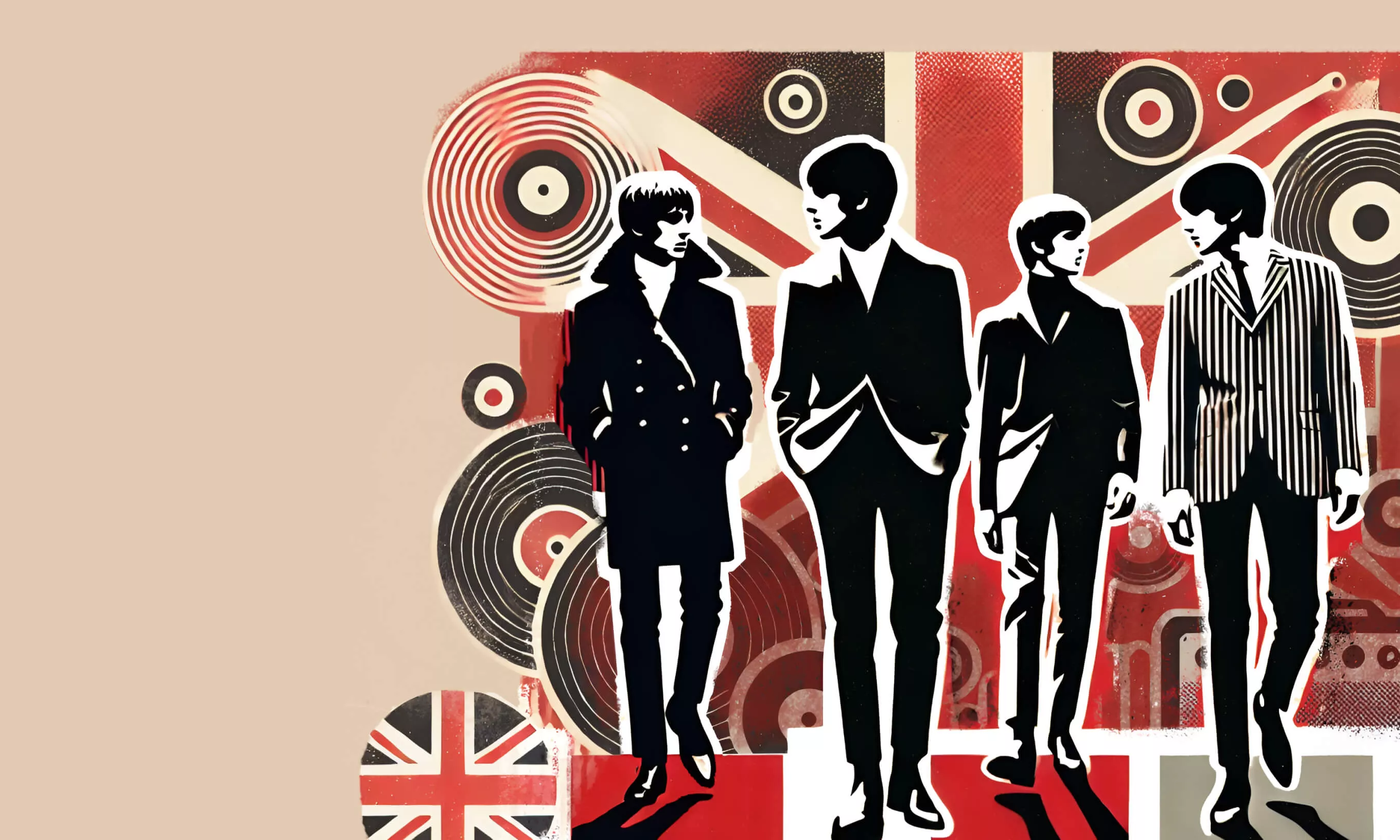Two bands, two paths to greatness – while the Beatles changed the world in a few short years, the Rolling Stones built a legacy that endures today. Author Rich Cohen reveals the business lessons hidden in their journeys.
For those of us who love business like we love rock ‘n’ roll, the world offers two great models. They are case studies for how to thrive as an organization: the Beatles and the Stones.
The Beatles came first – they recorded their debut single, “Please, Please Me,” in a ten-hour session on February 11, 1963. They caught fire quicker, and burned brighter. The Rolling Stones, who, led by guitarist Brian Jones in that original iteration, nicked their name from a Muddy Waters tune (“Got a boy child coming, gonna be a rollin’ stone”), took longer to ignite, but burned longer.
The Stones’ debut, a weak jumpy cover of Chuck Berry’s “Come On,” was released in June 1963. It did become a minor hit, but only because Stones’ manager Andrew Loog Oldham sent the band’s friends and groupies into the record stores to buy out the first pressing. In other words, the Stones started after the Beatles, and, for that first seven years, from 1963 (“Please Please Me!”) to 1970 (“Let It Be”) when the Beatles split, trailed like a shambolic prince in their wake.
And yet, creatively freed by the dissolution of the Beatles – they last recorded together in 1969 – and thus the need to give chase, the Stones would put together the greatest run of LPs in rock history: Beggars Banquet (1968), Let it Bleed (1969), Sticky Fingers (1971), and Exile on Main Street (1972). Like DiMaggio’s 56-game hitting streak or Gretzky’s 1,963 career assists, it’s a record that will never be matched. Then they continued, producing solid and occasionally great sides in the 1980s, 1990s, 2000s, and beyond. Their most recent album, Hackney Diamonds, was released in October 2023, by which time only two of the founding Stones – Mick and Keith – were still going.
And so here you have two types of businesses – a band is a gang but also a corporation. The Beatles burned brighter, but the Stones went the distance, which presents us with the Neil Young question: Is it better to burn out, or fade away?
If you approach the careers of these bands as if they were case studies, you will come away with lessons. Call it the Beatles vs. the Stones: tips for business.
The power of the individual vs. the strength of the collective
The Beatles
They functioned beautifully as a band, but it was their writing that made them the Beatles. It was the strength that came from their individual talents. Between sessions, the bandmates went off to compose alone. Each Beatle was told to come back with at least one new tune. As a result, the Beatles, blessed with three of the 20th century’s great songwriters (sorry, Ringo), were able to tap the power of the individual to assemble a wildly diverse catalog, with works ranging from rock ‘n’ roll, to beer hall ballad, to showtune.
The resulting battle of egos, with each Beatle trying to top the other, pushed them forward. Forever competing, forever inventing, forever new. It was a wave you could not ride forever. It was an engine pushed into the red. It sparked until the machine itself caught fire.
The leeway given the individual, how each Beatle was allowed to find his own way, would eventually tear the band apart. It took just seven years. Proximate causes might be suggested – (“It was Yoko”; “It was George”) – but the split was inevitable. The freedom to grow was also the freedom to grow apart. And so that great corporation dissolved like salt in water.
The Rolling Stones
They were built as a pale version of a Chicago blues band, and never aspired to be anything less or more than the equal of the electric combos Leonard and Phil Chess recorded at the Chess Records studio at 2120 South Michigan Avenue. Mick and Keith were tapped to write the songs, but did so less as individuals than as representatives of the band. They wrote for the Stones. They were its heart. Charley Watts (drums) and Bill Wyman (bass) were its engine. Brian Jones (lead guitar) was its musical gift. He was the best musician – as the first slide guitar player on the scene in London, Brian had performed as Elmo James – but could neither write hits nor cope with fame.
Because they couldn’t match the creativity of the Beatles, the Stones were left in the wake during the first years of the British Invasion, trying and failing to copy Lennon and McCartney. Her Satanic Majesties Request was the Stones’ lame attempt to match the psychedelic weirdness and chart-topping success of Sergeant Pepper’s. And yet, while the Beatles eventually burned through their fuel, the Stones always had the mothership – the band and the blues, with its twelve bar structure and slangy lyrics – to carry them through.
Staying close to the founding vision vs. the freedom of the open road
The Rolling Stones
While creating Seinfeld, Larry David famously told the writers that unlike Happy Days or All in the Family, there would be no character development on his show. “No hugging, no learning.” Each episode would end where it began, with the same cynical people having come away with neither moral nor lesson. Learning would mean improving, and improving would mean changing, and this is what leads to Archie Bunker speechifying on Civil Rights and Fonzy jumping the shark.
Brian Jones expressed a similar sentiment in those first years with the Stones. Forget hit records and pop tunes. We’re a blues band. Stay close to that vision, and we’ll never get lost. At their best, the Stones have remained a bar band, at home in a rank club – two bucks at the door, ripple and Chivas at the bar – where, as Muddy Waters said, people party from “Can ‘til can’t.”
It was the doctrine that saved the Stones whenever they strayed. The badness of Satanic Majesties almost killed them, but the hard-driving tune that followed, “Jumpin Jack Flash,” put them back on the rails. They might have limited themselves by sticking to that original vision, but it pointed north and saved them again and again.
The Beatles
If they had a founding vision, it was the love of music. If anything, they in fact seemed opposed to self-imposed constraints. No rules means the freedom to lay down your own tracks, to build your own railroad. They followed inspiration, instead, letting it carry them from early hard-driving tunes like the nearly punk “I Saw Her Standing There” all the way to “The Long and Winding Road,” which is less Joe Strummer than Marvin Hamlisch.
But here’s the problem – the Beatles got so far from the music they’d played in Liverpool it became impossible to find their way back. Free to drift with every whim, they eventually drifted apart, with each Beatle lost in his own trippy dream by the early 1970s. Absent the anchoring terra firma of a strategic plan, the Beatles microbus drove straight off a cliff.
Management through monarchy vs. the friction of a politburo
The Beatles
The band had two and possibly three, four, or even five leaders. There were John Lennon and Paul McCartney, who sat together in the pilot house, but also George Harrison, who gained strength as the years passed. Brian Epstein, the rich kid who discovered, managed, and promoted the band, and George Martin, the producer who mixed the records. It was Martin who added the classical elements that put the Beatles ahead of their time, which is why some call George Martin the Fifth Beatle.
In the way of an executive board or politburo, the Beatles made decisions as a rivalrous collective, battling until a consensus emerged, a synthesis that was often greater than any of the original ideas. The result was friction, the tension out of which the Beatles’ breathtaking dynamism emerged. But it also caused jam-ups and feuds. That’s why more and more time elapsed between each new album. The Beatles slowed and slowed until they stopped recording altogether. The band was arguably at its greatest at the end – that’s what it means to burn out.
The Rolling Stones
Brian Jones founded the group, which started with a newspaper ad answered by Mick and Keith. Jones named it and laid out the vision. He taught Jagger how to play blues harmonica and how to dress. But Mick was the frontman, and the girls and journalists love the frontman. In this way, Jagger became the focus and then used that focus to wrest control from Brian, who sulked himself to death. For a time, it seemed like it would be Mick and Keith (The Glimmer Twins) together at the helm, but Keith fell for heroin, taking himself out of command, leaving Jagger as a kind of CEO.
Though the Stones faced all the crises of big-time rock and roll – drugs busts, trials, jail time, jealousies – the CEO-like power of Jagger allowed him to carry the band through the ‘80s, ‘90s, and beyond. Lesson: if you have a good leader, let them lead.
It was the power that came with this office, as well as his business savvy, determination, and the realization that he’d never be as valuable to the world as a solo act as he was as a Rolling Stone, that enabled Jagger to push the band on and on. Though the Stones faced all the crises of big-time rock and roll – drugs busts, trials, jail time, jealousies – the CEO-like power of Jagger allowed him to carry the band through the ‘80s, ‘90s, and beyond. Lesson: if you have a good leader, let him lead.
You can’t always get what you want, but you can adapt
As a business leader, if you’re lucky, you get to choose where you work. But you typically inherit your organization, which becomes yours to shape and mold. Or, if you’re a founder, you get to create your own organization from the start. Are you like the Beatles or the Stones? Figure that out, you will know how to survive and prosper. If you find yourself in the Beatles, you should behave more like the Stones. And vice versa.
For non-musical cases in point, look no further than Apple and Microsoft. Microsoft started with stone cold, focused ambition like the Stones, but found new heights of success by embracing the Beatles-y creativity of gaming, open-source code, and artificial intelligence. And Apple has reached stratospheric new heights of success under efficiency-minded CEO Tim Cook, becoming the first U.S. company to reach a trillion-dollar valuation.
On the other hand, sometimes the lesson is blurred. Apple struggled in the late ‘80s when the company shifted away from visionary innovation to focus on business and profitability, and an expansive product line under John Sculley. Yet, in his later venture NeXT, Jobs might have succeeded had he not massively overindulged on innovation. It could be that the ultimate lesson is to know when to act like the Stones and when to act like the Beatles, and to learn how to swing smartly between the roles.
And that makes sense, because the bands were also similar in many ways. Same era, same nation, same love of the same music. Lennon and McCartney actually wrote the Stones’ second single, “I Wanna Be Your Man.” And there was talk of Brian Jones joining the Beatles after he was fired by the Stones in 1969. It’s not that they were so different that amazes. It’s that they were so alike while remaining different. Which may be why each found a way to function and adhered to it. Each lived out its destiny. Each went from “Can ‘til Can’t.”
Rich Cohen is the author of several New York Times bestsellers, a co-creator of the HBO series Vinyl, an Editor at Large at Air Mail, and a columnist at the Wall Street Journal. He has written for Rolling Stone, The New Yorker, The Atlantic, and Harper’s Magazine, among other publications. Most recently, Rich is the author of When the Game Was War: the NBAs Greatest Season. This article is part of our Beatles vs. Stones series, which also includes The Beatles, Stones, and the Algorithm and The Beatles, Stones, and the Business Benefits of Being Second.











